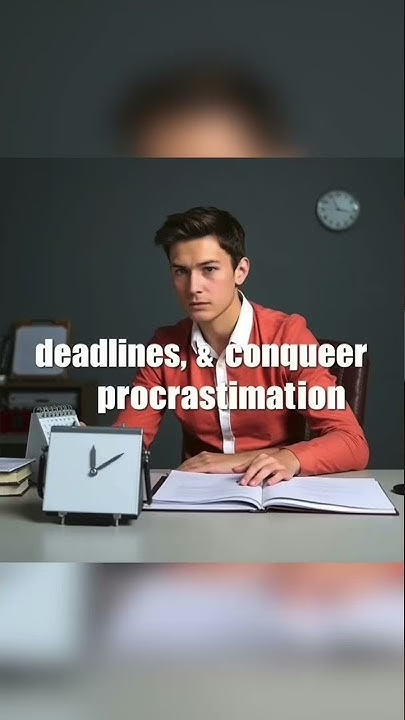Confession: I once delayed a major work project by binge-watching otter rescue reels. (Twice.) If you’ve ever promised yourself ‘five more minutes’ of scrolling that turned into an hour, you’re in good company. Procrastination isn’t laziness—it’s a tangled mess of emotions, brain wiring, and the impossible urge to chase instant fun over distant goals. Let’s pull back the curtain on what’s really going on in our heads (and what I wish I’d known years ago).
When Perfectionism Picks a Fight (And Loses)
Ever find yourself scrolling through TikTok instead of starting that important project? You’re not alone. I’ve been there too many times to count.
Fun fact: I’ve literally re-written the intro to this post three times already. Meta, right?
The Fear Behind Procrastination
Here’s something I’ve learned the hard way: it’s rarely laziness that keeps us stuck. It’s fear.
When I avoid writing, it’s not because I don’t want to work. It’s because I’m terrified of producing something mediocre. Sound familiar?
“Research shows that our brains are wired to seek instant gratification, making it hard to focus on long-term goals.”
Millions struggle with this same pattern. We’re literally fighting against our own neurology when we try to prioritize future rewards over present comfort.
The Perfectionism Trap
Perfectionism loves to whisper toxic little nothings in our ears:
- “If it can’t be amazing, why even start?”
- “Someone else could do this better.”
- “Remember that time you failed? This will be worse.”
And so we wait for the “perfect moment” to begin. Spoiler alert: it never comes.
My Personal Battle
Last week, I stared at a blank document for 45 minutes. Not because I had nothing to say, but because every opening line felt inadequate.
I wanted brilliance on the first try—which is absurd when I think about it. Do I expect to run a marathon without training? No. So why do I demand perfection in my first draft?
The irony? Once I finally typed anything down, the words started flowing. The perfectionist in me lost the fight, but my productivity won the war.
Sometimes the only way forward is to create something bad. Then make it better. But you can’t edit a blank page.

Why the Pomodoro Timer Became My (Very Motivated) Frenemy
I discovered the Pomodoro technique during my most desperate procrastination spiral. You know, the one where you’ve watched so many “productive day in my life” videos that you’ve somehow wasted three hours?
The Tomato Timer Takeover
The concept seemed almost too simple: 25 minutes of focus, five to snack/stretch/panic—rinse and repeat. That’s literally it. A productivity hack that even my scattered brain could handle.
“Work for 25 minutes, then take a 5-minute break. It boosts productivity while keeping burnout at bay.”
At first, I was skeptical. How could such tiny work chunks make a difference? My to-do list was MASSIVE. But then something weird happened…
The 25-Minute Magic
Those short work bursts actually ignited my productivity without the usual burnout! Turns out my brain wasn’t wired for 3-hour focus marathons after all.
Breaking tasks into bite-sized portions made everything feel manageable. That proposal I’d been avoiding for weeks? Suddenly just “four pomodoros” instead of a terrifying mountain.
Making It My Own
I’ve since personalized my pomodoro experience:
- Setting specific mini-goals for each 25-minute session
- Creating designated break activities (not just mindless scrolling)
- Tried: Pomodoro technique with a playlist of ’90s sitcom intros. Underrated combo?
The 5-minute breaks became something I actually looked forward to. A little reward for my focus efforts—sometimes a quick stretch, sometimes frantically eating snacks while staring out the window contemplating my life choices.
Some days I’m still resistant. My brain whines, “But I don’t wanna work for 25 whole minutes!” Then I remind myself that I previously spent longer than that just deciding which productivity app to download.
The pomodoro might be simple, but it’s been the most consistent frenemy in my productivity arsenal. And sometimes the simplest solutions are the ones that actually stick.
Break It Down Like a LEGO Set
Remember those massive LEGO sets with thousands of pieces? The ones that made you gasp when you first opened the box? That’s exactly how I felt staring at my project to-do list last month.
But here’s the thing about LEGOs: nobody builds the Death Star in one go. You start with step one, bag one.
The Sticky Note Revolution
I decided to try something radical (well, radical for me). I bought a pack of colorful sticky notes and went to war with my procrastination.
My experiment? Turning a terrifying project into what looked like a kindergartener’s art project on my living room wall.
- Blue notes: research tasks
- Pink notes: writing sections
- Yellow notes: technical stuff I’d definitely avoid otherwise
Each sticky had one specific task. Not “write report” but “write introduction paragraph” or even “find three statistics for opening section.”
Suddenly, my Mount Everest looked like a series of manageable hills.
“Break tasks into smaller chunks. This makes daunting projects feel more manageable and less overwhelming.”
The Psychology of Small Wins
Here’s what happened: I started ripping sticky notes off the wall. And it felt good.
Each tiny accomplishment gave me a little dopamine hit that pushed me toward the next one. Progress became visible, tangible.
Did I occasionally place notes ridiculously close to each other just so I could remove more of them? Maybe. Did it still work? Absolutely.
Why It Works
When projects remain monolithic, our brains get overwhelmed. We can’t process the enormity, so we freeze—or worse, we open TikTok “just for five minutes.”
Breaking things down creates:
- Clear starting points (no more “where do I begin?” paralysis)
- Visible progress markers
- Natural pause points to celebrate small victories
My wall of colorful paper scraps might have looked ridiculous, but watching those notes disappear one by one transformed an intimidating project into a series of satisfying little victories.
And isn’t that what beating procrastination is all about?

The Surprising Power of Botched Attempts (And Self-Compassion)
I used to think that messing up meant game over. You know, that sinking feeling when you realize you’ve blown a deadline or completely forgotten about a task? Yeah, that one.
But here’s what changed everything for me:
Slip-ups Are Just Data Points
When I miss the mark now, I don’t spiral. Instead, I think: Slipped up? That’s data, not defeat.
Last month, I completely forgot about a client deadline. My old self would have spent days in shame-spiral mode, questioning my worth as a professional.
Instead, I looked at what happened objectively. I was overbooked, hadn’t blocked my calendar properly, and was doom-scrolling TikTok as a stress response. Data, not disaster.
The Self-Compassion Game-Changer
Practicing self-compassion keeps shame at bay and motivation alive. It sounds fluffy, but it’s backed by science.
When you’re kind to yourself after messing up, you actually bounce back faster. The mental drag of self-criticism takes more energy than just acknowledging what happened and moving on.
“If you slip up, acknowledge it without judgment and refocus on your goals rather than dwelling on mistakes.”
My Botched Deadline Story
True story: I missed a deadline, owned it, moved on—best decision ever.
Instead of hiding or making excuses, I called the client immediately:
- Acknowledged I messed up (no excuses)
- Offered a quick solution
- Didn’t beat myself up about it
Guess what? They appreciated the honesty so much they extended our contract.
Being kind to yourself doesn’t mean letting yourself off the hook. It means addressing problems without the unnecessary weight of harsh self-judgment that keeps you stuck.
When you slip up, just refocus on your objectives rather than dwelling on the misstep. Your future self will thank you for it.
Wild Card: Borrowing Other People’s Momentum
Ever notice how hanging around go-getters is oddly contagious? I sure did.
Last month, I was stuck in a productivity rut. My to-do list was gathering digital dust while I mastered the art of staring blankly at my laptop. Then something unexpected happened.
The Accidental Productivity Hack
I found myself at this bustling café downtown—you know, the one with barely any outlets and overpriced lattes. Not exactly where I’d choose to work. But there I was, surrounded by people furiously typing, sketching business models, and having intense conversations about growth strategies.
And guess what? I worked for three solid hours. No breaks. No social media. Just pure focus.
Why? Simple peer pressure. The good kind.
Surrounding yourself with motivated individuals can inspire action, too.
It wasn’t just about feeling guilty for scrolling TikTok while everyone else hustled. Their energy literally transferred to me—like some weird productivity osmosis.
Strangers as Accountability Partners
I’ve since realized motivated folks equal built-in accountability partners, even when they’re complete strangers. There’s something about human connection that triggers our desire to keep up.
Science backs this up. Social accountability isn’t just a feel-good cliché—our brains are literally wired to match the energy of those around us.
Try These Momentum-Borrowing Tricks:
- Join a group study session (even if you’re years past college)
- Find a co-working space where people seem busy
- Try virtual focus rooms where strangers work together silently
- Schedule regular check-ins with a productive friend
I’m not saying you need to ditch your comfy home office permanently. But when motivation tanks, try borrowing someone else’s momentum.
Their energy might just be exactly what you need to kickstart your own progress. And sometimes, that’s all it takes to outsmart your inner procrastinator.

Outro: Procrastination Is a Practice (Not a Personality)
I used to think I was just “a procrastinator” – like it was hardwired into my DNA or something. But that’s the biggest myth I had to overcome.
Here’s what I’ve learned: procrastination isn’t who you are. It’s just something you do. And anything you do can be undone with practice.
My journey wasn’t perfect. Far from it.
Some days I crushed my to-do lists. Other days? Well, let’s just say TikTok won those battles. But each attempt – even the failed ones – taught me something valuable.
“Overcoming procrastination takes practice, but it’s possible with persistence and the right strategies in place.”
It’s About Progress, Not Perfection
The secret isn’t becoming some productivity superhero overnight. It’s about making small, consistent improvements:
- Celebrating small wins (even finishing that one email counts!)
- Forgiving yourself when you slip up
- Trying different approaches until you find what works for you
I’ve found that each try counts more than flawless execution. Those days when I managed just 10 minutes of focused work? Still victories.
Your Turn
What’s one thing you’ll finally check off this week?
Maybe it’s that email you’ve been avoiding. Or the dentist appointment you need to schedule. Or finally starting that side project.
Pick something small. Doable. Then just… start.
And I’d love to hear how it goes! Share your own procrastination battles and victories in the comments. Your story might be exactly what someone else needs to hear to get unstuck.
Remember, we’re all works in progress. The strategies I’ve shared throughout this post aren’t about becoming perfect – they’re about becoming better, one task at a time.
Now if you’ll excuse me, I have a long-overdue tax return with my name on it.
TL;DR: We all wrestle with procrastination, but small, clever changes—like breaking up tasks and cutting yourself some slack—can crack the code. Don’t wait for ‘motivation’ to strike; it’s persistence and messy tries that count.

